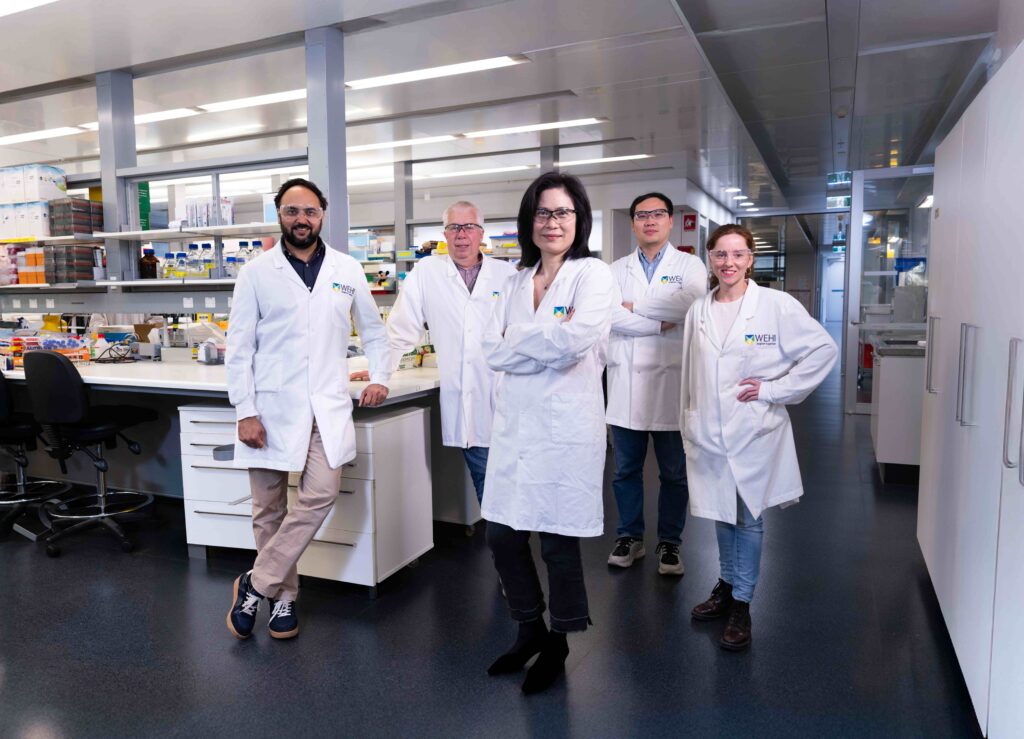
L to R: Professor Shalin Naik, Professor Stephen Nutt, Professor Jeanne Tie, Shengbo Zhang, Dr Cindy Audiger MRFF Frontiers Grant
The risk of being diagnosed with bowel cancer before the age of 40 has more than doubled since the year 2000, highlighting a critical need for more effective treatments. While modern immunotherapies have become standard for some cancers, their success against solid tumors, such as those found in the bowel, remains limited.
In a groundbreaking development, researchers at the Walter and Eliza Hall Institute of Medical Research (WEHI) have received a $17 million funding boost to enhance the capabilities of dendritic cells, particularly a subset known as DC1s, which have shown promise in generating a robust anti-tumor response.
Revolutionizing Cancer Treatment with Dendritic Cells
Dendritic cells are often described as the “James Bond” of the immune system. According to Professor Shalin Naik, chief investigator and WEHI laboratory head, these cells gather intelligence and alert the immune system’s defenses to the presence of viruses, bacteria, or cancer cells. “Our project aims to upgrade DC1s so that they are better able to recognize and attack cancer cells,” said Prof Naik.
WEHI researchers have been at the forefront of dendritic cell research since 1992. Recently, Prof Naik’s team discovered a novel method to generate a significantly higher number of DC1s from patient stem cells, a breakthrough that unlocks the potential for these cells to be harnessed in cancer treatment.
Government Support and Collaborative Efforts
The Australian government has shown strong support for this initiative. Minister for Health and Ageing Mark Butler emphasized the importance of investing in homegrown research. “We’re backing our researchers to turn cutting-edge discoveries into treatments that could save lives,” he stated. “This project gives real hope for new therapies that could change the story for thousands of Australians.”
WEHI will collaborate with Peter MacCallum Cancer Centre’s Centre of Excellence in Cellular Immunotherapy to advance this therapy to clinical trials within five years. Professor Simon Harrison, Director of the Centre, expressed enthusiasm for the partnership. “We are excited to team up with WEHI to advance dendritic cells as a novel therapy we hope can do for solid tumors what CAR T-cell therapies have achieved in blood cancers,” he said.
Supercharging Dendritic Cells with CAR Technology
The research team aims to enhance DC1s with chimeric antigen receptors (CARs), employing technologies that have revolutionized treatments for blood cancers. Professor Stephen Nutt, lead chief investigator and WEHI laboratory head, explained that infusing DC1s with CARs would effectively upgrade their capabilities. “We think these supercharged cells have the potential to revolutionize treatment for bowel cancer and other solid tumors,” said Prof Nutt.
This funding is a game-changer, allowing the team to develop this new therapy and bring it to patient testing. The implications of this research are profound, offering a potential lifeline to those affected by bowel cancer, a disease that claims numerous lives annually.
Looking Ahead: The Future of Cancer Treatment
The announcement comes as a beacon of hope in the fight against cancer, particularly for those battling solid tumors. By leveraging cutting-edge cell technology and innovative research, WEHI and its partners are paving the way for next-generation cancer therapies.
As the project progresses towards clinical trials, the potential impact on cancer treatment could be transformative. The collaboration between WEHI and Peter Mac is a testament to the power of scientific innovation and partnership in tackling some of the most pressing health challenges of our time.
For more information about WEHI and its groundbreaking research, visit www.wehi.edu.au.






